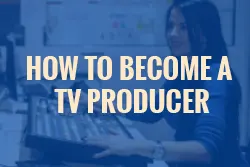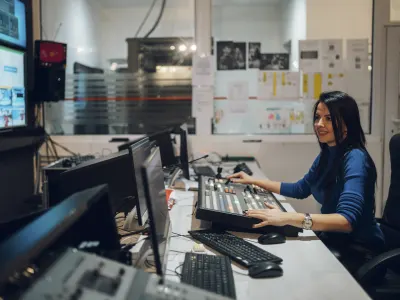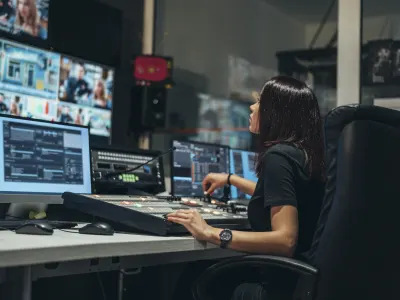Last Updated: July 2nd, 2022 by

Career Shortcuts
If you’re interested in a career in television production, it’s essential to get the proper education and training.
Many people think that because they watch TV, they would make great producers.
But, producing television is a complex process that takes years of experience and training to learn how to become a TV producer.
This blog post will discuss how to become a tv producer and what you need to do to become a successful TV producer.
Visit our Career Guide for a list of all our job insights for an in depth look at the new career path you are considering.
What Does a TV Producer Do?

Television producers are responsible for developing and putting together the various elements that make up a television program.
This includes everything from choosing the show’s concept and format to selecting the cast and crew, writing scripts, and overseeing production.
In some cases, producers may also be responsible for finding sponsors and arranging to finance.
In addition to these creative duties, producers must keep an eye on the budget and schedule, ensuring that the program stays on track and is completed within its allotted time and budget constraints.
While the day-to-day duties of a TV producer can vary depending on the type of program being produced, this job generally requires a combination of creativity, business acumen, and people skills.

Career Guide
How to Get Started in the Industry

Getting started in this field requires one to go through some steps, including the following:
Earn a Bachelor’s Degree
Becoming a television producer typically requires a bachelor’s degree in communications, broadcast journalism, or a related field.
Some producers have a master’s degree in business administration (MBA) concentrating in media management.
Those who want to become TV producers often begin their careers as interns or researchers and work their way up the ranks.
Many TV producers start as associate or assistant producers and move up to higher-level positions over time. Some producers also begin their careers as Production Assistants (PAs).
Get Experience
Producers typically need at least five years of experience in the television industry before they are eligible for job openings.
Becoming a TV producer is not an easy task; this job has many facets, and juggling all of them is crucial.
The most important thing for any aspiring TV producer is to get experience, and this can be done in several ways.
One is to work as an assistant or associate producer on a television show.
This will allow you to see how the different elements of a TV show come together and how the producer manages the overall production.
Another way to get experience is to work on independent film projects. This will allow you to gain experience in film production, from development and budgeting to post-production.
These experiences are essential when learning how to become a TV producer.
No matter what route you take, getting experience is essential for becoming a successful television producer.
Build a Portfolio
No matter what field you’re in, it’s always a good idea to have a portfolio. A portfolio is a collection of your work that showcases your skills, experience, and achievements.
It can be an online or physical collection, and it’s a great way to demonstrate your abilities to potential employers, clients, or collaborators.
Building a portfolio can seem daunting, but it doesn’t have to be. Start by selecting your best work.
This can be anything from papers you wrote in school to projects you completed for previous jobs. Once you choose solid examples, decide how you want to present them.
If you’re creating an online portfolio, for example, you can create a website or use an existing platform like Behance or LinkedIn.
If you’re putting together a physical portfolio, you should consider using a binder or folder to organize everything.
Once you have your portfolio assembled, take some time to promote it by sharing it with your network and making sure it’s easily accessible to anyone who might be interested in seeing it.
A well-crafted portfolio is an invaluable tool for any professional.
By taking the time to build one, you’ll be able to showcase your talents and accomplishments in a way that will impress potential employers.
Keep Networking
One of the most important things to remember when learning how to become a TV producer is that networking is critical.
Meeting people in the industry and making connections is one of the best ways to get your foot in the door.
Attend industry events, such as conferences and trade shows, is a great way to introduce yourself to as many people as possible.
You never know when one of those contacts could lead to your big break. In addition, don’t be afraid to reach out to producers you admire and ask for advice.
Most people in the television industry are happy to help out a fellow producer, and you never know what helpful insights they may have to offer.
So, don’t be afraid to network because it might be the key to success in this competitive field.
Be Professional
Last but not least, it’s important to remember that TV producers are professionals. This means that you should always be polite and respectful when interacting with others in the industry.
Whether you’re networking at an event or working on a set, it’s essential to conduct yourself professionally.
Additionally, it’s essential to be proactive and take the initiative when working on projects.
TV producers who can take charge and get things done are highly valued in the industry. So if you want to be successful, make sure you’re always putting your best foot forward.
Check out this video on what a Producer does in filmmaking!
FAQs

How Much Does a Television Producer Make?
Television producers typically earn an annual salary of $50,000-$100,000.
Salaries can vary depending on factors such as experience, location, and the size of the production company.
What are Some Skills Necessary for Becoming a Television Producer?
Critical skills necessary for becoming a successful television producer include leadership, multitasking, creativity, and problem-solving.
Additionally, it’s essential to work well under pressure and have excellent communication skills.
What Education is Necessary to Become a Television Producer?
There is no one-size-fits-all answer to this question. While some producers have a college degree in a related field, such as film or theatre, others may not.
However, most producers do have some form of formal education or training.
What are Some Challenges I May Face as a Television Producer?
Television producers face common challenges: tight deadlines, budget constraints, and complex personalities.
Additionally, it’s essential to handle stress and stay calm under pressure.
Conclusion
Becoming a television producer can seem like a daunting task, but if you have a passion for the industry, are willing to work hard, and follow the tips above, you’ll be well on your way to success.
So, don’t give up on your dreams—anything is possible with enough determination.
Other Interesting Articles
